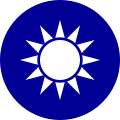| Secretary-General to the President 總統府秘書長 | |
|---|---|
| Reports to | President |
| Appointer | President |
| Term length | At the pleasure of the president |
| Constituting instrument | Office of the President Organization Act |
| Formation | 20 May 1948 (Office of the President established) 26 January 1996 (Current Organization Act) |
| First holder | Wu Dingchang |
| Deputy | Ho Chih-wei, Xavier Chang |
| Website | english |
| This article is part of a series on |
 |
|---|
The secretary-general to the president is the highest-ranking official in the Office of the President, Republic of China, and supervises the staff of the office. The current secretary-general is Pan Men-an.


